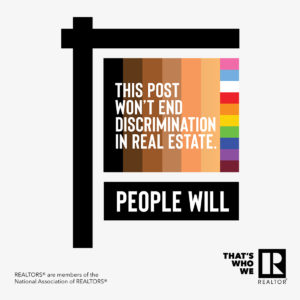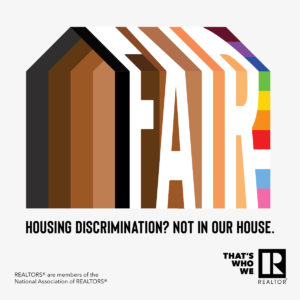Question: What is the racial composition of this neighborhood? Or, I only want to see white (Jewish, black, etc.) neighborhoods.
Key Points:
• Brokers and sales associates often work with homebuyers who have a preference for a neighborhood with a specific racial, religious, or ethnic character.
• Federal law prohibits you from marketing property based on the racial or ethnic makeup of the neighborhood.
Areas of Liability:
• You can expose yourself to charges of discrimination if you discourage or encourage a homebuyer to buy because of the racial, ethnic or religious composition of the neighborhood.
Actions to Take:
• If the homebuyer appears to restrict the home search on the basis of race, color, religion, sex, handicap, familial status, or national origin of a neighborhood’s residents, you should specifically note this on the homebuyer’s Equal Service Report Form.
• Never estimate or give an opinion on the racial, religious, or ethnic composition of the neighborhood.
• Refer homebuyers to sources of information such as the library or the local municipal offices, so they can research the questions themselves.
Suggested Response:
• Some courts have held brokers and agents in violation of the Fair Housing Act simply for answering that kind of question. If you really feel that such information is relevant, you should contact local authorities that may track census and other data.
Question: Are there high quality schools in the area?
Key Points:
• Many of the suits filed and cases that have gone to trial which allege “racial steering” involve comments by sales associates about schools.
• Professional testers often ask this kind of question to get a response that they can use to show that the sales associate attempted to influence the choice of housing.
Areas of Liability:
• If you make either complimentary or critical comments about schools based on the race of the homebuyer and the racial characteristics of the school population, you could be exposed to charges of racial discrimination.
Actions to Take:
• Provide the homebuyer only with reliable and authoritative information, such as student-teacher ratios, expenditures per pupil, percentage of students who go on to college, and the number of National Merit scholars from the recent graduating class.
• Refer the potential homebuyer to sources of information, such as the school or the school district’s main office.
• Maintain the same type of information for each school; never show favoritism for one school over another.
• Never attempt to influence a housing choice with either positive or negative general comments about the school or give an estimate or opinion of the racial, religious, or ethnic composition of the student body.
Suggested Response:
• To get the best answers to your questions, you should contact either the school or the school district’s main office.




